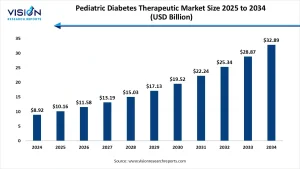The global pediatric diabetes management market size was valued at around USD 8.92 billion in 2024 and it is projected to hit around USD 32.89 billion by 2034, growing at a CAGR of 13.94% from 2025 to 2034. The market growth is driven by the rising prevalence of type 1 diabetes among children, the pediatric diabetes management market is experiencing robust growth.

Get a Sample@https://www.visionresearchreports.com/report/sample/41750
Pediatric Diabetes Management Market Overview
Pediatric diabetes management focuses on monitoring, treating, and supporting children and adolescents diagnosed with diabetes, primarily type 1 and increasingly type 2. With a rise in childhood diabetes globally, the demand for advanced insulin delivery systems, glucose monitoring devices, and digital health platforms has significantly increased. Healthcare providers are also prioritizing early diagnosis and personalized treatment approaches to improve long-term outcomes in young patients.
Pediatric Diabetes Management Market Growth
The pediatric diabetes management market is experiencing rapid expansion, driven by increased awareness, technological advancements, and higher prevalence rates of diabetes among children. Innovations such as continuous glucose monitors (CGMs), insulin pumps, and app-based remote monitoring systems are transforming diabetes care from a clinical model to a patient-centric one. Parents and caregivers are embracing smart devices that reduce the burden of disease management while improving glycemic control.
Focus on Emotional Well-being
Managing diabetes in children goes beyond physical care it also requires strong emotional and psychological support. Living with a chronic condition like diabetes can lead to stress, anxiety, and feelings of isolation, especially in young patients. As a result, pediatric diabetes programs are increasingly integrating behavioral health services alongside medical treatment. Hospitals and care centers now offer counseling, peer support groups, and family education sessions to help children and their caregivers cope with the daily challenges of diabetes. This holistic approach not only improves mental health but also enhances adherence to treatment plans and overall disease outcomes.
Government support and pediatric-specific healthcare policies are also contributing to the market’s growth. School-based programs and pediatric endocrinology initiatives across developing countries are playing a vital role in expanding access to care. With a robust pipeline of devices and digital tools, the market is expected to continue its upward trajectory through 2034.
Pediatric Diabetes Management Market Trends
- Rise of AI-powered Diabetes Tech: Tools integrated with AI algorithms are enabling personalized insulin dosing and predictive glucose trend analysis, enhancing treatment outcomes.
- Increased Use of Wearable Devices: Wearables like CGMs and smart insulin pens are gaining traction among pediatric patients for their real-time feedback and ease of use.
- Integration of Mobile Health (mHealth) Apps: Apps designed for children and caregivers help with tracking meals, insulin administration, and blood sugar levels, promoting active disease management.
- Focus on Behavioral and Emotional Support: Pediatric diabetes care is increasingly incorporating psychological support programs to address stress, anxiety, and treatment adherence.
Market Dynamics
Drivers
- Growing prevalence of type 1 diabetes among children globally
- Rising awareness and early diagnosis initiatives
- Technological advancements in insulin delivery and monitoring devices
Opportunities
- Expansion into emerging markets with rising pediatric diabetes cases
- Development of closed-loop insulin systems and artificial pancreas solutions
- Digital health integration for remote monitoring and virtual consultations
Challenges
- High cost of advanced diabetes management devices
- Limited pediatric endocrinology infrastructure in rural areas
- Need for consistent patient and caregiver education
Applications in the Market
Pediatric diabetes management is supported through various settings to ensure consistent care. At home, parents and caregivers use continuous glucose monitors (CGMs) and mobile apps for real-time glucose tracking and timely insulin adjustments. In hospitals, pediatric endocrinology units provide specialized care with advanced diagnostic tools to tailor treatment plans for each child. Schools play a vital role by creating diabetes-friendly environments, offering nurse-supervised medication support, and accommodating specific dietary and activity needs. Additionally, telemedicine platforms have made it easier for families to access virtual consultations and receive remote adjustments to treatment plans through integrated digital tools.
Case Study Real-World Impact
Smart Monitoring in Pediatric Care
At a children’s hospital in Germany, a pilot program used CGM devices integrated with mobile health apps for children aged 6–12. Over six months, the patients recorded a 35% improvement in time-in-range glucose levels. Parents reported reduced anxiety, and school performance improved due to better glycemic control. This case demonstrates the real-world benefits of combining technology with education in pediatric diabetes management.
Market Segments
- By Type: Type 1 Diabetes, Type 2 Diabetes
- By Device: Insulin Pumps, Continuous Glucose Monitors, Blood Glucose Meters, Smart Insulin Pens
- By Age Group: 0–5 years, 6–10 years, 11–18 years
- By End-User: Hospitals, Clinics, Homecare Settings
Read More:https://www.visionresearchreports.com/report/checkout/41750
Top Companies in Pediatric Diabetes Management Market
- Medtronic plc
- Dexcom, Inc.
- F. Hoffmann-La Roche Ltd
- Insulet Corporation
- Tandem Diabetes Care, Inc.
- Novo Nordisk A/S
- Sanofi S.A.
- Eli Lilly and Company
- Ypsomed AG
Future Outlook
The future of pediatric diabetes management is poised to become more personalized, data-driven, and accessible. Innovations such as artificial pancreas systems, AI-enabled diagnostics, and cloud-based patient management platforms are expected to lead the next phase of growth. Additionally, as healthcare equity becomes a central goal, expanded insurance coverage and international pediatric health initiatives will make these solutions more widely available. The market is set to play a pivotal role in transforming diabetes care for future generations.
Buy this Premium Research Report@https://www.visionresearchreports.com/report/checkout/41750
You can place an order or ask any questions, please feel free to contact
sales@visionresearchreports.com| +1 650-460-3308
